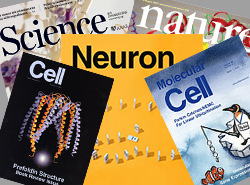Publication of IMPRS-LS student Anna Baptist

Baptist, A.V., and Heuer-Jungemann, A.
ACS Omega, 2023, 8, 18225-18233.
doi: 10.1021/acsomega.3c01680
Lyophilization Reduces Aggregation of Three-Dimensional DNA Origami at High Concentrations
Although for many purposes, low concentrations of DNA origami are sufficient, certain applications such as cryo electron microscopy, measurements involving small-angle X-ray scattering, or in vivo applications require high DNA origami concentrations of >200 nM. This is achievable by ultrafiltration or polyethylene glycol precipitation but often at the expense of increasing structural aggregation due to prolonged centrifugation and final redispersion in low buffer volumes. Here, we show that lyophilization and subsequent redispersion in low buffer volumes can achieve high concentrations of DNA origami while drastically reducing aggregation due to initially very low DNA origami concentrations in low salt buffers. We demonstrate this for four structurally different types of three-dimensional DNA origami. All of these structures exhibit different aggregation behaviors at high concentrations (tip-to-tip stacking, side-to-side binding, or structural interlocking), which can be drastically reduced by dispersion in larger volumes of a low salt buffer and subsequent lyophilization. Finally, we show that this procedure can also be applied to silicified DNA origami to achieve high concentrations with low aggregation. We thus find that lyophilization is not only a tool for long-term storage of biomolecules but also an excellent way for up-concentrating while maintaining well-dispersed solutions of DNA origami.
